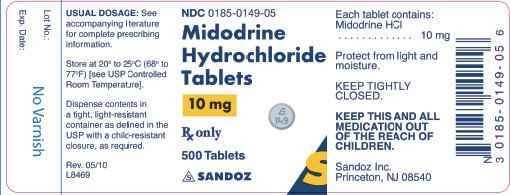
Contents
Side Effects of ProAmatine (midodrine)
ProAmatine (midodrine) is a vasopressor and anti-hypotensive drug used to treat symptomatic orthostatic hypotension (low blood pressure and dizziness on standing).
Because ProAmatine can cause marked elevation of supine blood pressure (BP greater than 200 mmHg systolic), it should be used in patients whose lives are considerably impaired despite standard clinical care, including non-pharmacologic treatment (such as support stockings), fluid expansion, and lifestyle alterations.
The indication is based on ProAmatine’s effect on increases in 1-minute standing systolic blood pressure, a surrogate marker considered likely to correspond to a clinical benefit.
At present, clinical benefits of ProAmatine, principally improved ability to perform life activities, have not been established. Further clinical trials are underway to verify and describe the clinical benefits of ProAmatine.
Common side effects of ProAmatine include
- tingling,
- tickling,
- burning or prickling sensation,
- high blood pressure (hypertension) while laying down and sitting,
- numbness and itching which mainly affects the scalp area,
- goosebumps,
- chills,
- urinary urge,
- urinary retention, and
- urinary frequency.
Rare side effects of ProAmatine include
- weakness,
- dry mouth,
- difficulty sleeping,
- anxiety,
- backache,
- canker sores,
- confusion,
- dizziness,
- dry skin,
- skin redness,
- facial flushing,
- gas,
- upset stomach,
- heartburn,
- leg cramps,
- nausea,
- tiredness, and
- vision problems.
Drug interactions of ProAmatine include other medications that may also reduce the heart rate such as cardiac glycosides, tricyclic antidepressants, beta blockers, and other agents because ProAmatine may cause a decrease in the heart rate.
- Medications which have similar stimulatory effects on alpha-adrenergic receptors such as phenylephrine, pseudoephedrine, ephedrine, phenylpropanolamine, dihydroergotamine, and other agents that cause vasoconstriction may enhance the pressor effects of ProAmatine.
- Alpha-adrenergic blocking agents such as prazosin, terazosin, and doxazosin may antagonize or cancel out the effects of ProAmatine therapy.
- ProAmatine may compete with drugs such as metformin, cimetidine, ranitidine, procainamide, triamterene, flecainide, and quinidine for elimination by clearance through the kidneys.
It is unknown if ProAmatine will harm a fetus. Tell your doctor if you are pregnant or plan to become pregnant.
It is unknown if ProAmatine is excreted in breast milk. Due to the lack of safety data, ProAmatine should be used cautiously in nursing mothers.
What are the important side effects of ProAmatine (midodrine)?
The most common side effects of midodrine treatment are
- tingling,
- tickling,
- burning or prickling sensation,
- supine and sitting hypertension,
- numbness and itching which mainly affects the scalp area,
- goosebumps,
- chills,
- urinary urge,
- urinary retention, and
- urinary frequency.
Rare side effects associated with midodrine treatment are
- weakness,
- dry mouth,
- difficulty sleeping,
- anxiety,
- backache,
- canker sores,
- confusion,
- dizziness,
- dry skin,
- erythema,
- facial flushing,
- gas,
- upset stomach,
- heartburn,
- leg cramps,
- nausea,
- tiredness, and
- vision problems.
ProAmatine (midodrine) side effects list for healthcare professionals
The most frequent adverse reactions seen in controlled trials were
- supine and sitting hypertension;
- paresthesia and pruritus, mainly of the scalp; goosebumps;
- chills;
- urinary urge;
- urinary retention and
- urinary frequency.
The frequency of these events in a 3-week placebo-controlled trial is shown in the following table:
Adverse Events
| Event | Placebo n=88 |
Midodrine n=82 |
||
| # of reports | % of patients | # of reports | % of patients | |
| Total # of reports | 22 | 77 | ||
| Paresthesia 1 | 4 | 4.5 | 15 | 18.3 |
| Piloerection | 0 | 0 | 11 | 13.4 |
| Dysuria 2 | 0 | 0 | 11 | 13.4 |
| Pruritis 3 | 2 | 2.3 | 10 | 12.2 |
| Supine hypertension 4 | 0 | 0 | 6 | 7.3 |
| Chills | 0 | 0 | 4 | 4.9 |
| Pain 5 | 0 | 0 | 4 | 4.9 |
| Rash | 1 | 1.1 | 2 | 2.4 |
| 1 Includes hyperesthesia and scalp paresthesia 2 Includes dysuria (1), increased urinary frequency (2), impaired urination (1), urinary retention (5), urinary urgency (2) 3 Includes scalp pruritus 4 Includes patients who experienced an increase in supine hypertension 5 Includes abdominal pain and pain increase |
||||
Less frequent adverse reactions were
- headache;
- feeling of pressure/fullness in the head;
- vasodilation/flushing face;
- confusion/thinking abnormality;
- dry mouth;
- nervousness/anxiety and rash.
Other adverse reactions that occurred rarely were
- visual field defect;
- dizziness;
- skin hyperesthesia;
- insomnia;
- somnolence;
- erythema multiforme;
- canker sore;
- dry skin;
- dysuria;
- impaired urination;
- asthenia;
- backache;
- pyrosis;
- nausea;
- gastrointestinal distress;
- flatulence and
- leg cramps.
The most potentially serious adverse reaction associated with ProAmatine therapy is supine hypertension. The feelings of paresthesia, pruritus, piloerection and chills are pilomotor reactions associated with the action of midodrine on the alpha-adrenergic receptors of the hair follicles. Feelings of urinary urgency, retention and frequency are associated with the action of midodrine on the alpha-receptors of the bladder neck.
What drugs interact with ProAmatine (midodrine)?
Midodrine may cause a decrease in the heart rate. Caution should be used when midodrine is given in other medications that may also reduce the heart rate such as
- cardiac glycosides,
- tricyclic antidepressants,
- beta blockers, and
- other agents.
Medications which have similar stimulatory effects on alpha-adrenergic receptors may enhance the pressor effects of midodrine. Examples of such medications include
- phenylephrine,
- pseudoephedrine,
- ephedrine,
- phenylpropanolamine,
- dihydroergotamine, and
- other agents that cause vasoconstriction.
Alpha-adrenergic blocking agents such as prazosin (Minipress), terazosin (Hytrin), and doxazosin (Cardura) may antagonize or cancel out the effects of midodrine therapy.
Midodrine may compete with drugs such as metformin (Glucophage), cimetidine (Tagamet), ranitidine (Zantac), procainamide (Pronestyl), triamterene (Dyrenium), flecainide (Tambocor), and quinidine for elimination by renal tubular secretion (clearance through the kidneys). Caution should be used if midodrine must be used with any of these agents.
When administered concomitantly with ProAmatine, cardiac glycosides may enhance or precipitate bradycardia, A.V. block or arrhythmia.
The risk of hypertension increases with concomitant administration of drugs that increase blood pressure (phenylephrine, pseudoephedrine, ephedrine, dihydroergotamine, thyroid hormones, or droxidopa). Avoid concomitant use of drugs that increase blood pressure. If concomitant use cannot be avoided, monitor blood pressure closely.
Avoid use of MAO inhibitors or linezolid with midodrine.
ProAmatine has been used in patients concomitantly treated with salt-retaining steroid therapy (i.e., fludrocortisone acetate), with or without salt supplementation.
The potential for supine hypertension should be carefully monitored in these patients and may be minimized by either reducing the dose of fludrocortisone acetate or decreasing the salt intake prior to initiation of treatment with ProAmatine.
Alpha-adrenergic blocking agents, such as prazosin, terazosin, and doxazosin, can antagonize the effects of ProAmatine.
Potential For Drug Interaction
It appears possible, although there is no supporting experimental evidence, that the high renal clearance of desyglymidodrine (a base) is due to active tubular secretion by the base-secreting system also responsible for the secretion of such drugs as metformin, cimetidine, ranitidine, procainamide, triamterene, flecainide, and quinidine.
Thus there may be a potential for drug-drug interactions with these drugs.
Summary
ProAmatine (midodrine) is a vasopressor and anti-hypotensive drug used to treat symptomatic orthostatic hypotension (low blood pressure and dizziness on standing). Common side effects of ProAmatine include tingling, tickling, burning or prickling sensation, high blood pressure (hypertension) while laying down and sitting, numbness and itching which mainly affects the scalp area, goose bumps, chills, urinary urge, urinary retention, and urinary frequency. It is unknown if ProAmatine will harm a fetus. Tell your doctor if you are pregnant or plan to become pregnant. It is unknown if ProAmatine is excreted in breast milk. Due to the lack of safety data, ProAmatine should be used cautiously in nursing mothers.


